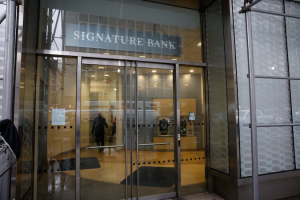Join Our Telegram channel to stay up to date on breaking news coverage
The third bank to close its doors in a week and the third biggest bank failure in American history, Signature Bank was immediately taken over by New York regulators on Sunday night.
Many were surprised by the decision to close the cryptocurrency-friendly bank, which provided loans to businesses in the digital asset sector and enabled crypto-to-fiat transactions via its Signet network (including those who worked there.)
So why was it shut down? And does it fit into a larger regulatory attack on cryptocurrency?
Founder of the Dodd-Frank Act and current board member of Signature Bank, Barney Frank, stated to CNBC yesterday that the bank’s closure was done to “send a very strong anti-crypto message.” But, Frank’s claim was rejected by the New York Department of Financial Services today.
In an email to publication Decrypt, the regulator claimed that the decision had nothing to do with cryptocurrencies and that it had “been facilitating well-regulated crypto activity for some years, and is a national example for regulation the field.” Nevertheless, business insiders who spoke with Decrypt say they don’t buy it and point to a growing pattern that dates back many months to several years.
According to Cailin Long, CEO and creator of crypto bank Custodia,
The de-banking of the crypto business has definitely been happening since the beginning of the year. I believe what Barney Frank said because he had no incentive to lie.
Sheila Warren, CEO of the Crypto Council for Innovation, said in an interview that recent regulatory remarks “seem to equate to de facto restrictions on engaging with all crypto enterprises, regardless of their business methods.”
A prohibition on banking access, according to Warren,
would signify that the US is choosing not to be competitive in the tech field and would prefer that unregulated parts of the economy and other countries lead, marking a sea change for the approach to innovation and entrepreneurship in the US.
The problems at Signature Bank had been building for some time; last month, investment and algorithmic trading firm Statistica Capital filed a class-action lawsuit against the bank, alleging that it had enabled the activities of the defunct digital asset exchange FTX. The Nasdaq later stopped trading in the bank’s shares after crypto-friendly bank Silvergate announced its liquidation. As a result, Signature’s stock price plummeted.
Yet, according to Bloomberg, who cited unnamed sources, the bank’s management was taken aback by the New York regulators’ decision to seize it.
Particularly following the November collapse of the major digital asset exchange FTX, regulators and lawmakers have been harshly cracking down on the world of digital assets recently.
U.S. legislators demanded details on American banks’ connections to cryptocurrency in a letter to Federal Reserve Chairman Jerome Powell back in December. Democratic senators Tina Smith of Minnesota and Elizabeth Warren of Massachusetts both specifically mentioned Signature Bank and Silvergate, which voluntarily shut down last week, in their warning about the connections between traditional banks and cryptocurrency.
Since then, banks with ties to the cryptocurrency industry have encountered issues, notably Long’s Custodia, which was refused membership in the Federal Reserve System in January by the American Federal Reserve Board. The Fed is currently being sued by Custodia for its refusal.
Dear God. Barney Frank openly admits that Signature was arbitrarily shuttered despite no insolvency because regulators wanted to kill off the last major pro-crypto bank. Colossal scandalhttps://t.co/Sa25w6Au7b pic.twitter.com/gLuiybHepS
— nic "bankful" carter (@nic__carter) March 13, 2023
It is unquestionably consistent with the trend I’ve noticed, Long added.
Custodia was the first in what is evidently a wave of attempts to get banks out of banking the legal digital asset business.
Operation Choke Point 2.0
Not just Long holds that opinion. Earlier this month, venture entrepreneur Nic Carter asserted that the American government is utilizing the banking industry to “orchestrate a sophisticated, comprehensive campaign against the crypto industry”—which he called Operation Choke Point 2.0.
Lawmakers have also cautioned that the actions of the American government are reminiscent of the divisive Operation Choke Point program from the Obama administration, which prohibited banks from doing business with a number of firms. Four Republican legislators asked federal banking regulatory agency leaders in a letter sent only last week why they were putting pressure on reputable digital asset companies.
Since the closure of the cryptocurrency-friendly bank Silvergate on March 8 and the subsequent closure of Signature Bank a few days later, crypto businesses are once more excluded from the world of conventional finance.
If cryptocurrency is to become widely used, this is a major issue: Organizations like crypto exchanges want connection to conventional banks like Signature so that their consumers can purchase assets like Bitcoin and pay out in U.S. dollars.
The decision by the New York state Department of Financial Services to take action on Sunday “happened in the middle of a wide regulatory assault on cryptocurrency by several federal and state agencies,” according to Nisa Amoils, managing partner at A100x Ventures.
FTX’s enormous failure spurred regulators scurrying to find out how to oversee the fast-moving and difficult digital asset space—in part, since so many U.S. clients lost money in the exchange’s insolvency.
Jerome Powell, the chairman of the Federal Reserve, stated last week that financial institutions must “take great care” in how they interact with the world of digital assets.
He continued by saying that he didn’t want to suppress creativity.
Mercury, Customers, and other banks are still available for cryptocurrency, according to Amolis. Regulators, she continued, are ultimately responsible for their destiny.
Related
- All deposits at SVB, Signature Bank will be guaranteed by the U.S. Treasury, FDIC, and Federal Reserve in an unforeseen move
- After SVB Crisis, Coinbase CEO Weighs Options For Banking Services
- Operation Choke Point 2.0: US goes after crypto amid confusion and uncertainty
Join Our Telegram channel to stay up to date on breaking news coverage


